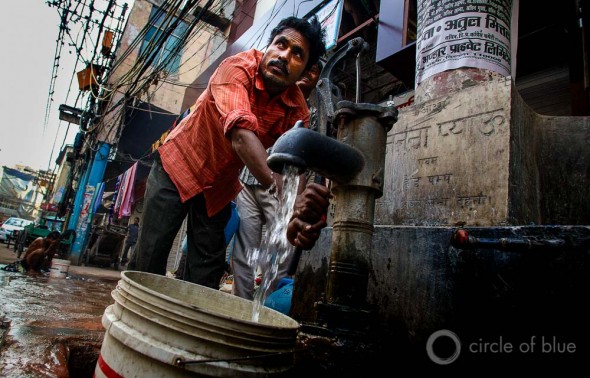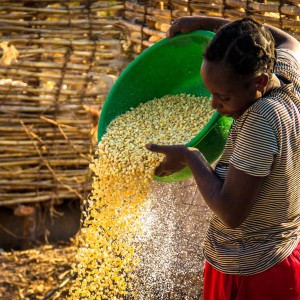The Stream, March 2: Drought Looms in Central Asia
The Global Rundown
Central Asia should prepare for scarce water supplies in the Amu Darya river basin this year, according to the president of Tajikistan. A drought in Africa has cut water flows over Victoria Falls to 30-year lows. Shutting off the water supply to New Delhi was a calculated move by protesters frustrated by a lack of economic opportunities, journalists say. Global access to clean water has improved, but unevenly. Florida lawmakers dropped a bill that would have allowed hydraulic fracturing in the Everglades over water supply concerns. A growing number of schools in the United States are finding lead in their drinking water.

Getting water in Dehli. Photo © J. Carl Ganter / Circle of Blue
“By cutting off Delhi’s water and invoking social equality, what the Jats are really saying is this: There are no jobs, and we, in the countryside, are seething.” –Aman Sethi, an Indian journalist, writing about the underlying frustrations that led to protests last month that cut off the water supply to India’s capital. (The New York Times)
By The Numbers
30-year lows Rate of water flowing over Victoria Falls between Zambia and Zimbabwe. A drought in the region has greatly diminished water supplies in the Zambezi River and the Kariba Lake reservoir. Reuters
8.5 million people Population of Tajikistan, where the president ordered officials to ready enough food stocks for the country in preparation for a drought this year. A drought could create tension between Tajikistan and downstream water users that rely on the Amu Darya, like Uzbekistan. Reuters
Science, Studies, And Reports
An interactive graphic created by National Geographic tracks where access to clean water has improved and declined globally since 1990. Progress on water access has been uneven across regions, and between cities and rural areas, the graphic shows. National Geographic
On The Radar
Florida lawmakers abandoned attempts to pass a bill that could have allowed hydraulic fracturing for oil and gas in the Everglades. Public opposition to the bill centered around concerns about contamination of the Biscayne Aquifer, which provides drinking water to more than three million people. Guardian
A series of schools across the United States have discovered high levels of lead in their drinking water, triggering concerns that the problem could be widespread. Schools are not required to independently test for lead if they get their water from public supplies, though water can sit for longer periods of time in school pipes, possibly increasing the risk of lead leaching. Guardian
A news correspondent for Circle of Blue based out of Hawaii. She writes The Stream, Circle of Blue’s daily digest of international water news trends. Her interests include food security, ecology and the Great Lakes.
Contact Codi Kozacek





Leave a Reply
Want to join the discussion?Feel free to contribute!